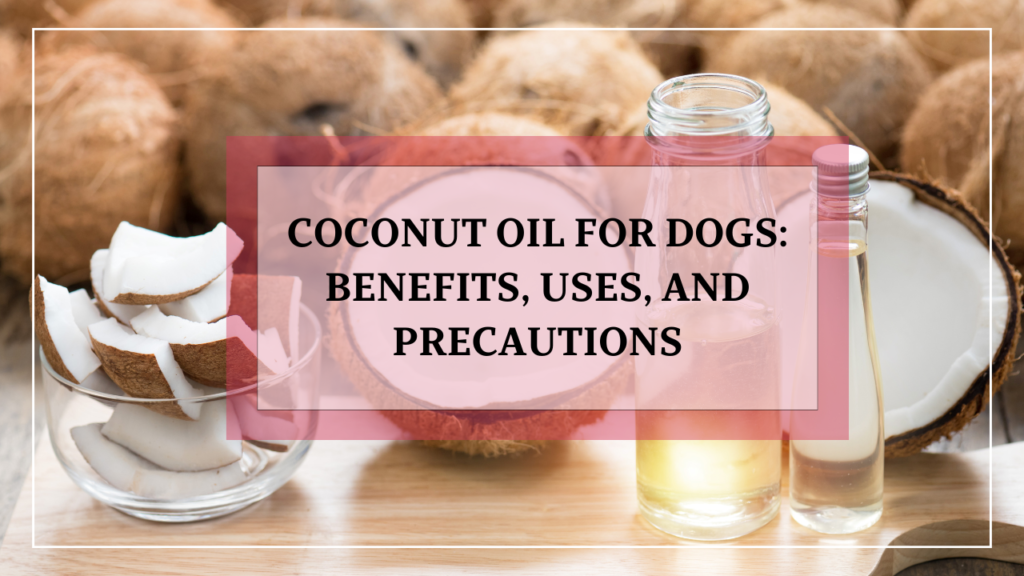Coconut oil has become a buzzword in the pet care community, frequently recommended for its multitude of benefits. As more dog owners seek natural remedies to enhance their pets’ health and well-being, coconut oil for dogs has emerged as a popular choice. This versatile oil, derived from the meat of mature coconuts, is rich in beneficial nutrients that can contribute positively to your dog’s overall health. In this post, we will explore the various advantages, uses, and precautions of incorporating coconut oil into your dog’s diet and care routine.
Nutritional Profile of Coconut Oil
Coconut oil is not only prized for its various health benefits but also for its rich nutritional profile. Understanding what coconut oil contains is essential for dog owners considering its incorporation into their pet’s diet.
Fatty Acids in Coconut Oil
Coconut oil is composed primarily of saturated fats, which differ from the polyunsaturated fats commonly found in many other oils. The most notable fatty acids in coconut oil are medium-chain triglycerides (MCTs).
Discuss Medium-Chain Triglycerides (MCTs)
MCTs are a unique type of saturated fat that the body metabolizes differently compared to long-chain triglycerides (LCTs). They are composed of fatty acids with medium-length carbon chains, making them more easily digestible and quickly utilized for energy.
Key MCTs in Coconut Oil:
- Lauric Acid: Approximately 48% of coconut oil is lauric acid, which is known for its antibacterial and antiviral properties.
- Capric Acid: This makes up about 7% and also contributes to the oil’s antimicrobial benefits.
- Caprylic Acid: Another 7%, caprylic acid is known for its antifungal properties.
Benefits of MCTs for Dogs
- Quick Energy Source: MCTs are rapidly absorbed by the body and converted into energy. This can be especially beneficial for active dogs or those needing a boost in stamina.
- Supports Weight Management: MCTs can help promote a healthy weight by increasing the feeling of fullness, which may reduce overeating. They also aid in metabolism, helping dogs burn fat more efficiently.
- Enhanced Brain Function: There is emerging research suggesting that MCTs may support cognitive function. This is particularly important for older dogs or those with cognitive dysfunction syndrome, potentially improving memory and overall mental clarity.
- Gut Health: MCTs possess antimicrobial properties that can help maintain a balanced gut microbiome. This is crucial for overall digestive health and can aid in managing gastrointestinal issues.
Vitamins and Antioxidants
Coconut oil is also a source of various vitamins and antioxidants that contribute to a dog’s health.
Overview of Vitamins in Coconut Oil
- Vitamin E: This vitamin acts as a powerful antioxidant, helping to combat oxidative stress and inflammation. It supports skin health, promotes a shiny coat, and can assist in preventing skin issues.
- Vitamin K: Essential for blood clotting and bone health, vitamin K plays a vital role in maintaining your dog’s overall wellness. Although found in smaller amounts, its presence in coconut oil adds to its nutritional value.
Antioxidant Properties and Their Importance for Canine Health
Antioxidants play a crucial role in protecting cells from damage caused by free radicals, which can lead to various health issues, including cancer and chronic diseases.
- Combatting Oxidative Stress: The antioxidant properties of coconut oil, particularly from vitamin E, help reduce oxidative stress in dogs. This is important for aging dogs or those with health conditions that may predispose them to inflammation or disease.
- Supporting Immune Function: By neutralizing free radicals, antioxidants support the immune system, helping dogs resist infections and maintain optimal health.
- Promoting Skin Health: Antioxidants contribute to healthier skin by reducing inflammation and improving healing, making coconut oil a beneficial option for dogs with skin sensitivities or conditions.
Benefits of Coconut Oil for Dogs
Incorporating coconut oil for dogs can provide a variety of health benefits, enhancing their quality of life. Here, we’ll delve into the specific advantages that coconut oil offers across different aspects of canine health.
Skin and Coat Health
Coconut oil is well-known for its remarkable benefits for a dog’s skin and coat.
How Coconut Oil Can Help with Dry Skin and Itching
Many dogs suffer from dry skin, which can lead to itching, flaking, and discomfort. Coconut oil can be a soothing remedy:
- Moisturizing Properties: The fatty acids in coconut oil penetrate the skin and provide deep hydration, helping to alleviate dryness and soothe irritation.
- Anti-Inflammatory Effects: Coconut oil’s anti-inflammatory properties can help reduce redness and swelling associated with skin allergies or sensitivities.
Benefits for Coat Shine and Overall Appearance
Using coconut oil regularly can enhance your dog’s coat:
- Increased Shine: Applying coconut oil can make a dull coat shiny and vibrant, as it nourishes the fur and promotes healthy growth.
- Reduced Shedding: By keeping the skin moisturized and healthy, coconut oil may help reduce excessive shedding.
Digestive Health
Coconut oil can also play a crucial role in supporting digestive health.
Role of Coconut Oil in Improving Digestion
The MCTs in coconut oil are easily digestible and can improve overall digestive function:
- Enhanced Nutrient Absorption: Coconut oil helps the body absorb essential nutrients more effectively, which is vital for a dog’s overall health.
Potential Benefits for Dogs with Gastrointestinal Issues
For dogs with sensitive stomachs or gastrointestinal disorders, coconut oil can be beneficial:
- Soothing Effect: Coconut oil can help calm an upset stomach and reduce inflammation in the gut, making it easier for dogs to digest food.
- Antimicrobial Properties: Its antimicrobial properties can help combat harmful bacteria and promote a healthier gut environment.
Weight Management
Maintaining a healthy weight is crucial for your dog’s overall well-being, and coconut oil can assist in this area.
Discuss How MCTs Can Aid in Weight Loss or Maintenance
MCTs have unique properties that can aid in weight management:
- Boosting Metabolism: MCTs can increase energy expenditure, which helps dogs burn more calories and maintain a healthy weight.
- Promoting Satiety: Coconut oil can help dogs feel full longer, reducing the likelihood of overeating.
Tips for Incorporating Coconut Oil in a Weight Management Plan
- Start Slowly: Introduce coconut oil gradually to avoid digestive upset. Monitor your dog’s weight regularly.
- Combine with a Balanced Diet: Ensure coconut oil is part of a well-rounded diet to promote healthy weight loss or maintenance.
Immune System Support
Coconut oil offers significant immune system benefits due to its antimicrobial and antifungal properties.
Antimicrobial and Antifungal Properties of Coconut Oil
The lauric acid and other fatty acids in coconut oil can help protect against infections:
- Fighting Infections: Coconut oil can combat bacteria, viruses, and fungi, helping to reduce the risk of illnesses.
How It Can Help Boost the Immune System
A strong immune system is vital for overall health:
- Enhancing Immune Response: The nutrients in coconut oil can enhance your dog’s immune response, helping them fight off diseases more effectively.
Oral Health
Coconut oil can also be a valuable addition to your dog’s dental hygiene routine.
The Benefits of Coconut Oil for Dental Hygiene
Coconut oil can help improve oral health in several ways:
- Plaque Reduction: The antimicrobial properties can help reduce plaque buildup and combat bad breath.
- Strengthening Gums: Coconut oil may also promote healthy gums and prevent gum disease.
Explanation of Oil Pulling and Its Application for Dogs
Oil pulling is a practice where oil is swished in the mouth to promote oral health:
- How to Practice Oil Pulling with Dogs: Apply a small amount of coconut oil to your dog’s teeth and gums, allowing them to chew or lick it. This can help reduce bacteria and improve dental health.
How to Use Coconut Oil for Dogs
Incorporating coconut oil for dogs into their diet and care routine can be simple and effective. Here are some practical guidelines on how to use it properly.
Dosage Recommendations
Getting the dosage right is crucial for maximizing the benefits of coconut oil while minimizing any risks.
General Guidelines for Dosing Based on Dog Size and Health
- Small Dogs (up to 10 lbs): Start with 1/4 teaspoon per day.
- Medium Dogs (11-30 lbs): 1/2 teaspoon per day.
- Large Dogs (31-50 lbs): 1 teaspoon per day.
- Extra Large Dogs (51 lbs and up): 1-2 teaspoons per day.
Always consult your veterinarian for personalized dosing recommendations, especially for dogs with underlying health issues.
Cautions for First-Time Users
- Start Slow: Introduce coconut oil gradually to your dog’s diet to avoid gastrointestinal upset.
- Monitor Reactions: Watch for any signs of allergies or digestive issues. If problems occur, reduce the amount or discontinue use.
Incorporating Coconut Oil into Your Dog’s Diet
There are many ways to seamlessly add coconut oil to your dog’s meals.
Suggestions for Mixing Coconut Oil with Food
- Drizzle on Kibble: Simply pour a small amount of coconut oil over your dog’s kibble to enhance flavor and nutrition.
- Mix with Wet Food: Combine coconut oil with wet food for added moisture and taste.
Recipes or Ideas for Homemade Dog Treats Using Coconut Oil
- Coconut Oil Dog Biscuits:
- Ingredients: 2 cups whole wheat flour, 1/2 cup coconut oil, 1/2 cup peanut butter, 1/4 cup water.
- Directions: Mix all ingredients until a dough forms. Roll out and cut into shapes. Bake at 350°F for 20 minutes or until golden.
- Coconut Oil Frozen Treats:
- Ingredients: 1 cup coconut oil, 1 banana (mashed), 1/2 cup unsweetened pumpkin puree.
- Directions: Mix ingredients and pour into ice cube trays. Freeze until solid for a refreshing treat.
Topical Applications
Coconut oil can also be applied directly to your dog’s skin for various benefits.
How to Apply Coconut Oil to the Skin
- Direct Application: Gently massage a small amount of coconut oil into dry or irritated areas of your dog’s skin.
- Hot Spots: For inflamed or painful areas, apply coconut oil generously to soothe and promote healing.
Tips for Using Coconut Oil for Hot Spots or Dry Patches
- Clean the Area First: Ensure the affected area is clean before applying coconut oil.
- Monitor the Area: Check for any changes and consult your veterinarian if the condition doesn’t improve.
Potential Risks and Precautions
While coconut oil for dogs offers numerous benefits, it’s important to be aware of potential risks and precautions to ensure your pet’s safety and well-being.
Allergies and Sensitivities
Although coconut oil is generally considered safe for dogs, some may exhibit allergic reactions or sensitivities.
Signs of Allergic Reactions to Coconut Oil
Keep an eye out for the following signs if you introduce coconut oil to your dog’s diet or apply it topically:
- Skin Reactions: Redness, itching, or swelling at the site of application, or generalized skin irritation.
- Gastrointestinal Distress: Vomiting, diarrhea, or unusual changes in appetite can indicate a sensitivity to coconut oil.
- Behavioral Changes: If your dog seems lethargic, restless, or uncomfortable, it might be a sign of an allergic reaction.
What to Do If Your Dog Shows Sensitivity
If you notice any of the above symptoms after introducing coconut oil:
- Discontinue Use: Stop using coconut oil immediately to prevent further reactions.
- Consult Your Veterinarian: Contact your vet for advice and potential alternatives to coconut oil. They may recommend allergy testing or suggest different products that are safer for your dog.
- Monitor Symptoms: Keep track of any ongoing symptoms and provide your veterinarian with detailed observations to aid in diagnosis.
Overconsumption and Digestive Issues
While coconut oil can be beneficial in moderation, excessive consumption can lead to health issues.
Risks of Too Much Coconut Oil Leading to Diarrhea or Weight Gain
- Digestive Upset: Overconsumption of coconut oil can lead to diarrhea, especially if introduced too quickly or given in large quantities. The high-fat content may overwhelm a dog’s digestive system, leading to discomfort.
- Weight Gain: Coconut oil is calorie-dense, and excessive use can contribute to weight gain. This is particularly concerning for dogs already at risk for obesity or those on a strict weight management plan.
Importance of Moderation
To ensure that coconut oil remains a healthy addition to your dog’s diet:
- Follow Dosage Guidelines: Stick to the recommended dosage based on your dog’s size and health. This helps to maximize benefits while minimizing risks.
- Monitor Your Dog’s Weight: Regularly check your dog’s weight and adjust coconut oil intake as needed to maintain a healthy balance.
- Introduce Gradually: When starting with coconut oil, introduce it slowly to allow your dog’s digestive system to adjust.
FAQs About Coconut Oil for Dogs
As a pet owner, you may have some questions about the use of coconut oil for dogs. Here are answers to some common inquiries to help you better understand its benefits and safety.
Can All Dogs Benefit from Coconut Oil?
While many dogs can benefit from coconut oil, individual responses may vary. Most dogs experience positive effects, particularly in terms of skin and coat health, digestion, and weight management. However, some dogs may have allergies or sensitivities. It’s essential to monitor your dog closely when introducing coconut oil and consult your veterinarian for tailored advice.
Is Coconut Oil Safe for Puppies?
Coconut oil is generally safe for puppies, but moderation is key. Due to their developing digestive systems, puppies should be introduced to coconut oil gradually. Start with small amounts and observe for any adverse reactions. Always consult your veterinarian before adding new supplements to your puppy’s diet, especially if they have specific health concerns.
How Does Coconut Oil Compare to Other Oils for Dogs?
Coconut oil has unique properties that set it apart from other oils commonly used for dogs:
- Nutritional Profile: Unlike many oils, coconut oil contains a high level of medium-chain triglycerides (MCTs), which can provide quick energy and support metabolism.
- Antimicrobial Properties: Coconut oil’s lauric acid offers natural antibacterial, antifungal, and antiviral benefits, which some other oils lack.
- Versatility: Coconut oil can be used both topically and in the diet, making it a multifunctional choice for dog owners.
While oils like olive oil and fish oil also offer health benefits (such as omega fatty acids), coconut oil is distinctive due to its specific composition and versatility. Each oil has its advantages, so consider your dog’s individual health needs and consult with your veterinarian to determine the best option.

Hi, I’m Ali Tarek, the founder of Animalsman. I’ve always been passionate about pets, especially dogs and cats, and I created this website to share practical tips, easy recipes, and helpful care advice for fellow pet lovers. My goal is to make pet care simple, enjoyable, and accessible for everyone. When I’m not writing or curating content, you’ll usually find me spending time with my furry friends or learning new ways to keep them happy and healthy.



